Search
Remove Ads
Advertisement
Summary 
Loading AI-generated summary based on World History Encyclopedia articles ...
Search Results

Definition
Fertile Crescent
The Fertile Crescent, often called the "Cradle of Civilization", is the region in the Middle East which curves, like a quarter-moon shape, from the Persian Gulf, through modern-day southern Iraq, Syria, Lebanon, Jordan, Israel and northern...

Article
Agriculture in the Fertile Crescent & Mesopotamia
The ancient Near East, and the historical region of the Fertile Crescent in particular, is generally seen as the birthplace of agriculture. The first agricultural evidence comes from the Levant, from where it spread to Mesopotamia, enabling...
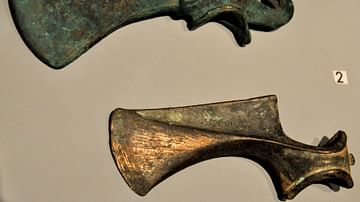
Collection
Fertile Crescent - Cradle of Civilization
The Fertile Crescent is a region stretching from northern Egypt across to the Persian Gulf and was the home to the oldest civilizations in history such as the Sumerians, earning it the common name of the 'Cradle of Civilization'. First populated...

Image
Fertile Crescent Map
Map of the Fertile Crescent, a region stretching in a quarter-moon shape from Mesopotamia down through the Levant. The region is bordered by the Persian Gulf and Zagros Mountains to the east, Taurus Mountains to the north, Mediterranean sea...
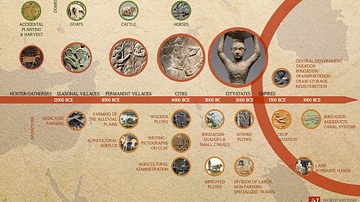
Image
Agriculture in the Fertile Crescent and Mesopotamia - Timeline
A visual timeline illustrating the evolution of agriculture in parallel with invention and social development in the region of the Fertile Crescent (a term first used in 1916 by Egyptologist J.H. Breasted), enabling the establishment of cities...

Image
Map of the Fertile Crescent
The term "Fertile Crescent," (a term first used in 1916 by Egyptologist J.H. Breasted), describes a crescent-shaped region spanning the Eastern Mediterranean, Anatolia, and Mesopotamia—often called the "Cradle of Civilization." This area...
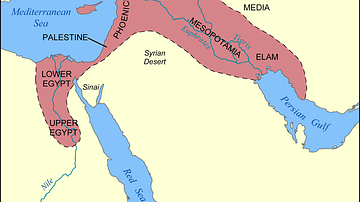
Image
Map of the Fertile Crescent
This map shows the location and extent of the Fertile Crescent, a region in the Middle East incorporating ancient Egypt; the Levant; and Mesopotamia.
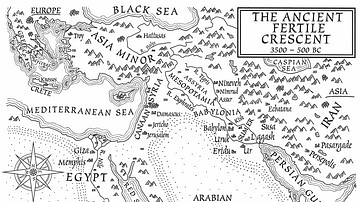
Image
A Map of the Ancient Fertile Crescent (From the Novel The Jericho River)
An illustrated map of the ancient Fertile Crescent, 3500-500 BCE. From the novel The Jericho River by David Tollen.
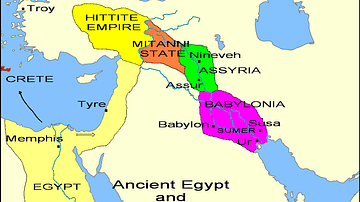
Image
States of the Fertile Crescent, c. 1450 BCE
A map illustrating the various political states within the Fertile Crescent c. 1450 BCE.

Video
Mesopotamia and the Fertile Crescent - A Short History
Mesopotamia is an ancient region in the Middle East, east of the Mediterranean by the Zagros mountains, between the two rivers Tigris and Euphrates. The name ‘Mesopotamia’ comes from the Greek meaning ‘between two rivers’. The region is now...